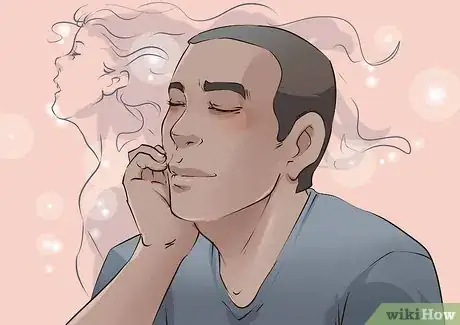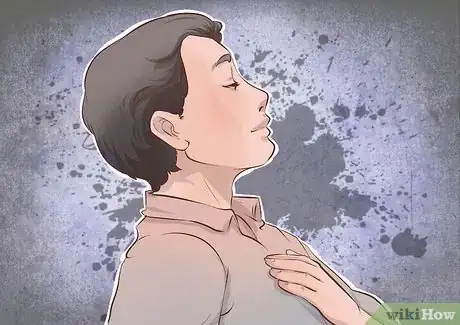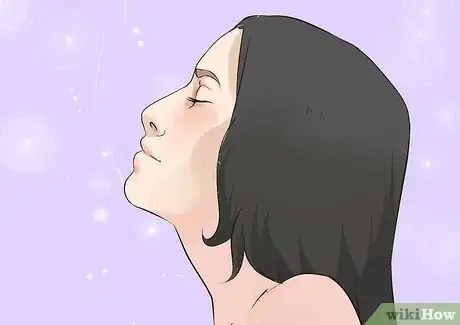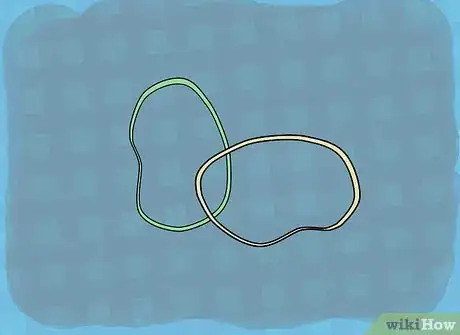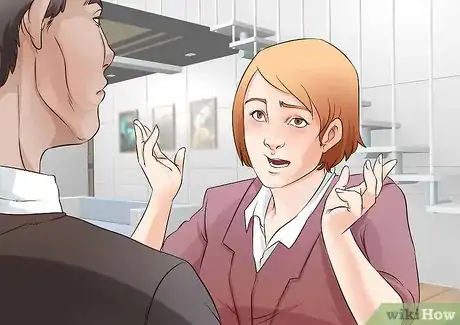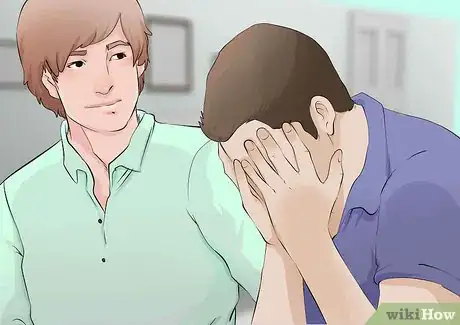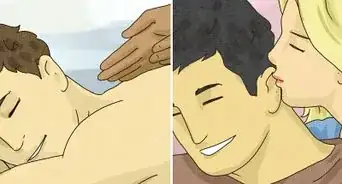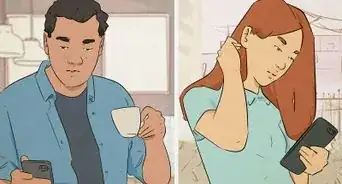This article was co-authored by Klare Heston, LCSW. Klare Heston is a Licensed Independent Clinical Social Worker based in Cleveland, Ohio. With experience in academic counseling and clinical supervision, Klare received her Master of Social Work from the Virginia Commonwealth University in 1983. She also holds a 2-Year Post-Graduate Certificate from the Gestalt Institute of Cleveland, as well as certification in Family Therapy, Supervision, Mediation, and Trauma Recovery and Treatment (EMDR).
There are 8 references cited in this article, which can be found at the bottom of the page.
wikiHow marks an article as reader-approved once it receives enough positive feedback. In this case, 95% of readers who voted found the article helpful, earning it our reader-approved status.
This article has been viewed 145,211 times.
When infatuation turns from euphoria to obsession, it’s time to make some changes. Constantly thinking of someone can take a toll on your life and cause an unhealthy mental situation. The good news is you don’t have to obsess over this person forever. You can overcome this infatuation by getting back to reality, refocusing your thoughts, and getting help and support.
Steps
Getting Back in Touch with Reality
-
1Analyze the person's faults. It’s difficult to see nothing else about a person you’re infatuated with except for how amazing they are. However, no one is perfect and everyone has flaws--even them. Make a list of their negative qualities to bring you back down to reality.
- Finding these flaws will likely take some time. Engage with the person outside of your regular circumstances or spend more time with them than usual. Chances are, seeing them outside of your typical scenario will show you a different, and unflattering, side.[1]
- If, after significant time and effort, you are unable to find any flaws, this could signal an especially problematic obsession. Seek professional help immediately.
-
2Look at patterns of infatuation. Have you been through this before? Chances are, if you’re infatuated with someone now you have likely been in the same situation previously. If obsession is a common occurrence in your life, tell yourself so.
- For example, when your feelings get overwhelming, remind yourself that this is just something that you do. It’s not indicative that you are completely in love with or can’t live without this person, it’s simply a tendency you have. Coming to terms with that may make you realize that your infatuation is just a habit.[2]
- Try journaling. Journaling can help you organize your thoughts and better understand patterns of infatuation in your life.
Advertisement -
3Give it time. The saying “time heals all wounds” is popular because it is true. Look back at other moments in your life when you were obsessed or infatuated with someone or something. Ask yourself how you feel about them today. Chances are you are completely over it and over time, this infatuation will be a distant memory, too.[3]
Refocusing Your Thoughts
-
1Think about someone else. Telling yourself to simply stop thinking about your infatuation won’t work. In fact, there’s proof that trying to stop these thoughts typically makes them worse. Instead, encourage your mind to think about something else: another person.
- Think about the person you are already in a relationship with if you are in one. Ponder a time when you felt really close and connected to the person. You’ll likely find that experiencing these feelings kick the other person out of your head.[4]
- If you aren't in a relationship, focus on someone else you admire, such as a close friend, a family member, or a respectable member of your community.
-
2Use your imagination. Play mind games with yourself whenever you start to obsess about the person. Occupying your brain with a clever trick can stop the thoughts and encourage you to think about something else.
- For instance, imagine your mind as a small room that has a person with a broom living in it. Think about the person sweeping away dust and dirt on the floor of that room whenever your infatuation enters your mind. Continue this game until the floor is completely clean and the thought leaves your brain.[5]
-
3Snap out of it, literally. Pain is an excellent deterrent and can be used to stop obsessive thoughts. Wrap a rubber band around your wrist and snap it against your skin whenever you begin to think of your infatuation. Eventually, you’ll likely associate the pain with these thoughts and stop.[6]
- Don’t snap the band too hard! The sensation should be mild.
- Combine the wrist snap with a visual aid, like a red light or a stop sign. Think of these images whenever the unwanted thoughts pop up.
-
4Distract yourself. Redirect your brain by engaging in an activity. You’ll get your mind off of what you’re infatuated with while enjoying yourself at the same time.
- For example, read a book, watch your favorite television show, exercise, or call someone. The positive feelings you generate from these activities will likely eventually replace the negative ones you feel over your infatuation.[7]
Getting Help and Support
-
1Talk to a professional. Patterns of infatuation are often indicative of a love addiction. You may have become dependent on the feelings you experience when you are infatuated with a person so you tend to repeat the same behaviors. A therapist may be able to help you break the cycle.
- Ask your friends, family members, or a doctor for recommendations. Look online for names if you don’t feel comfortable asking those you know.[8]
-
2Consider the underlying issue. Talk with a therapist about why you became infatuated with this person. They may help you realize insecurities you have about yourself that were temporarily resolved because of the obsession. They may also help you discover a psychological reason for your infatuation.[9]
- For instance, you could have borderline personality disorder and may not know it. Repeated infatuation and obsession could be a sign that you are struggling with this condition.[10]
- If you feel your obsession is getting out of control, you may be at heightened risk for self-harm. Communicate your feelings to your therapist. They will likely make a contract with you to eliminate self-harm.
-
3Confide in your loved ones. Talking about your infatuation may help you realize a few things you never did before. Those close to you may be able to help you identify the reasons why your infatuation is senseless, which may give you the encouragement to move on. They can also offer you support when you’re feeling hopeless about the situation.
- Consider also asking your support system to help you get over the person by spending more time with you, helping to eliminate the person’s presence in your life, and reminding you of how imperfect they are, when you’re struggling.[11]
Expert Q&A
Did you know you can get expert answers for this article?
Unlock expert answers by supporting wikiHow
-
QuestionWhat is the difference between love and infatuation?
 Klare Heston, LCSWKlare Heston is a Licensed Independent Clinical Social Worker based in Cleveland, Ohio. With experience in academic counseling and clinical supervision, Klare received her Master of Social Work from the Virginia Commonwealth University in 1983. She also holds a 2-Year Post-Graduate Certificate from the Gestalt Institute of Cleveland, as well as certification in Family Therapy, Supervision, Mediation, and Trauma Recovery and Treatment (EMDR).
Klare Heston, LCSWKlare Heston is a Licensed Independent Clinical Social Worker based in Cleveland, Ohio. With experience in academic counseling and clinical supervision, Klare received her Master of Social Work from the Virginia Commonwealth University in 1983. She also holds a 2-Year Post-Graduate Certificate from the Gestalt Institute of Cleveland, as well as certification in Family Therapy, Supervision, Mediation, and Trauma Recovery and Treatment (EMDR).
Licensed Social Worker
-
QuestionWhat does it mean when someone says they are infatuated with you?
 Klare Heston, LCSWKlare Heston is a Licensed Independent Clinical Social Worker based in Cleveland, Ohio. With experience in academic counseling and clinical supervision, Klare received her Master of Social Work from the Virginia Commonwealth University in 1983. She also holds a 2-Year Post-Graduate Certificate from the Gestalt Institute of Cleveland, as well as certification in Family Therapy, Supervision, Mediation, and Trauma Recovery and Treatment (EMDR).
Klare Heston, LCSWKlare Heston is a Licensed Independent Clinical Social Worker based in Cleveland, Ohio. With experience in academic counseling and clinical supervision, Klare received her Master of Social Work from the Virginia Commonwealth University in 1983. She also holds a 2-Year Post-Graduate Certificate from the Gestalt Institute of Cleveland, as well as certification in Family Therapy, Supervision, Mediation, and Trauma Recovery and Treatment (EMDR).
Licensed Social Worker When someone says they are infatuated by you it can mean a lot of different things... possibly: 1) They really value something about you that they have not encountered in the past; 2) They are carried away by passion or admiration; 3) They have an attraction not based on anything tangible. Be careful.
When someone says they are infatuated by you it can mean a lot of different things... possibly: 1) They really value something about you that they have not encountered in the past; 2) They are carried away by passion or admiration; 3) They have an attraction not based on anything tangible. Be careful. -
QuestionWhen are you infatuated with someone?
 Klare Heston, LCSWKlare Heston is a Licensed Independent Clinical Social Worker based in Cleveland, Ohio. With experience in academic counseling and clinical supervision, Klare received her Master of Social Work from the Virginia Commonwealth University in 1983. She also holds a 2-Year Post-Graduate Certificate from the Gestalt Institute of Cleveland, as well as certification in Family Therapy, Supervision, Mediation, and Trauma Recovery and Treatment (EMDR).
Klare Heston, LCSWKlare Heston is a Licensed Independent Clinical Social Worker based in Cleveland, Ohio. With experience in academic counseling and clinical supervision, Klare received her Master of Social Work from the Virginia Commonwealth University in 1983. She also holds a 2-Year Post-Graduate Certificate from the Gestalt Institute of Cleveland, as well as certification in Family Therapy, Supervision, Mediation, and Trauma Recovery and Treatment (EMDR).
Licensed Social Worker
References
- ↑ https://psychcentral.com/lib/love-versus-infatuation/
- ↑ http://www.cnn.com/2007/LIVING/personal/10/09/end.relationship/
- ↑ http://www.goodtherapy.org/blog/infatuation-in-my-forties-was-it-a-midlife-crisis/
- ↑ https://www.psychologytoday.com/blog/mental-mishaps/201505/how-stop-thinking-about-someone
- ↑ https://www.psychologytoday.com/blog/schlepping-through-heartbreak/201008/four-tricks-stop-obsessing
- ↑ https://psychcentral.com/blog/archives/2013/12/26/7-ways-to-stop-obsessing/
- ↑ http://www.huffingtonpost.com/mary-montero/obsessing-over-a-breakup-_b_783732.html
- ↑ http://www.cnn.com/2007/LIVING/personal/10/09/end.relationship/
- ↑ https://psychcentral.com/blog/archives/2013/12/26/7-ways-to-stop-obsessing/
About This Article
Having an infatuation can take over your life, but grounding techniques and distraction can help you to overcome the obsession. Try to see the flaws in the person that you’re infatuated with to remind yourself that they are only human. Although it can be difficult, knowing that they aren’t perfect can help to ground yourself in reality. Think about someone else that you admire to take your mind off the person you’re infatuated with. Pick a family member, friend, or your partner if you’re in a relationship and think about their positive qualities to distract yourself. You can also distract yourself by doing activities you enjoy. Read a book, watch a television show, or go for a walk to replace some of your negative thoughts with positive ones. If you have trouble overcoming your infatuation, speak to a mental health professional for support. For more information on overcoming an infatuation, like how to confide in your loved ones, read on.

